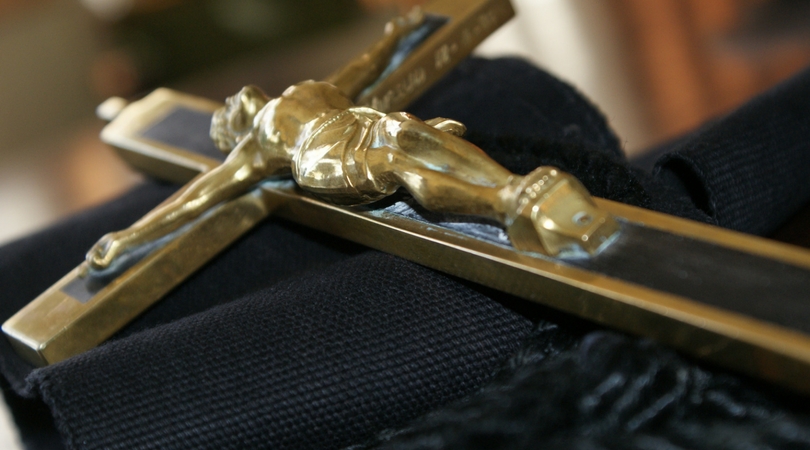One of the powerful ceremonies of each mission was the penitential procession carried out very dramatically in order to convey an unforgettable life-changing message: “by his wounds you have been healed.”
I repeat, it is the norm that the superior carry the cross during the penitential procession, after he has given a short exhortation from the pulpit to prepare the people for this public act of reparation.
This is no entertainment, but an act very much in conformity with the spirit of the Church and perfectly suited to the occasion. The superior has just preached to a people that has gone astray. He gives them the hope of pardon.
Reparation, however, is necessary. He takes on himself the sins of the people, in imitation of Jesus Christ whom he represents in their midst, … he offers himself to God as a victim.
Letter to Bruno Guigues, 5 November 1877, EO IX n 652
The Oblate invited the people to load their sins on him and to see him carrying them away – reenacting the message of Jesus.
 I Peter 2: 24-25:“He himself bore our sins in his body on the cross, so that, free from sins, we might live for righteousness; by his wounds you have been healed. For you were going astray like sheep, but now you have returned to the shepherd and guardian of your souls.”
I Peter 2: 24-25:“He himself bore our sins in his body on the cross, so that, free from sins, we might live for righteousness; by his wounds you have been healed. For you were going astray like sheep, but now you have returned to the shepherd and guardian of your souls.”
(See also the entry https://www.eugenedemazenod.net/?p=492 and the following few entries)

No entertainment indeed. I think for a moment of Jesus as he was scourged and led through the people on the way to Calvary, and to hang on the cross. How he was jeered and made fun of; how he was treated like a piece of entertainment for the crowds. We don’t know how many of those people were converted that day, who saw Jesus carrying his cross and heard of him dying and who came to believe.
I think of Eugene and his brothers preparing for that first mission to Marignane and praying to be effective. They needed very quickly in the sense of time, to be able to cut through the defenses of the people who had little in the way of hope and comfort; whose lives were about shattered and torn sensibilities and who needed to be shown how to “see beneath the rags that they wore”.
We ourselves are called in these days of the pandemic to be innovative, to be daring, to step forward and try new ways of praying and coming together. We look for ways of connecting that do not involve touching or being physically close and with other people. Many of us are no longer able to simply sit back and wait for the churches to reopen so that we can go back to our old ‘normal’ way of living and being. We try to express ourselves, our love for each other with masks covering half of our faces and connecting through computer screens or window panes of glass. We seek new ways of being small Christian communities and being able to more fully participate in that.
I look at the people who are rising up from within our midst at home, from within our parishes. I look at how they are finding new ways to feed the poor, to clothe the naked and to care for the sick… They are not doing it to make themselves look good or to put on an act. They are doing it because they love and wish to share their experience(s) of God.
This letter to Bruno Guigues was written in 1837 (not 1877) in a time of continued upheaval and political unrest in France; just as it is around the world today. The faces are different but the circumstances are eerily similar in many ways.
Eugene is once more a model for us 200 years later, just as Jesus was 2000 years ago.